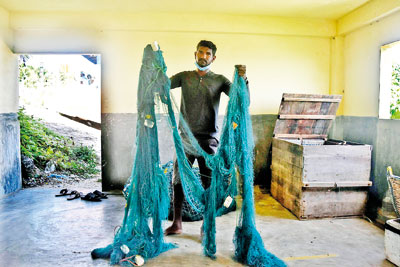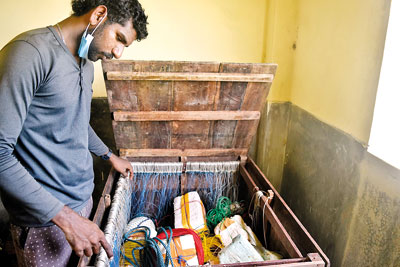News
Northern fishermen in sea of misery, as Indian raiders’ plunder continues in Lankan waters

The affected northern fishermen show their damaged fishing gear. They say they took bank loans and pawned jewellery to buy the nets. It will cost Rs. 40,000 to repair a damaged net. They ask who will give them the money to repair the nets.
Vogarasa Rajkumar, 27, is the sole breadwinner of his young family of three. Though originally from Myliddy, Kankesanthurai, another fisheries village some 10 kilometres away, he settled down in Velvettithurai with his extended family following multiple displacements in the past.
Even after the war ended 12 years ago, ensuring a decent livelihood to support his family, it is still a challenge. Uncontained illegal bottom trawling by Indian fishermen in northern waters is disrupting his livelihood.
In mid-August, fishing nets worth Rs 400,000 which, he says, he bought through a bank loan, were destroyed in mid-sea when a massive mechanized Indian trawler passed his vessel.
“We tried to show them through torch lights that our fishing nets are undersea and we were waiting for a catch, but they did not bother. We were able to retrieve only parts of the damaged fishing nets and return to shore empty-handed,” Mr Rajkumar told
the Sunday Times.
It was the fifth incident reported within the two weeks before the end of August.
The affected fishermen filed complaints with the local Fisheries Department demanding compensation but there were no assurances.
“I took a bank loan and pawned some family jewellery to buy fishing nets. Even to repair them now, it would cost at least Rs 40,000. Who is going to give money to me? Somehow I have to raise that amount,”
Mr Rajkumar said.

The affected northern fishermen show their damaged fishing gear. They say they took bank loans and pawned jewellery to buy the nets. It will cost Rs. 40,000 to repair a damaged net. They ask who will give them the money to repair the nets.
More than two dozen fishermen have lost their nets or suffered from damage to nets in Mr Rajkumar’s village recently due to aggressive bottom trawling by Indian fishermen.
Nearly three years after bottom trawling in Lankan waters was banned, following continuous demand from northern fishermen to implement the law, the Fisheries Department has finally decided to prosecute those who trespass into Sri Lanka’s territorial waters.
Last week, Fisheries Director General S.J. Kahawatte issued a directive to all assistant directors in district offices instructing them to implement the Fisheries Act No 1 of 2018 (Regulation of Foreign Fishing Boat) Amendment immediately.
Accordingly, the charges would be under two categories: entering into Lankan territorial waters illegally for fishing in a foreign fishing boat without a permit, and entering the territorial waters without keeping the fishing gear stowed in the foreign fishing boat while using bottom trawl net towed by mechanised vessels.
This comes after reports of clashes between local fisherfolk and Indian trawlers last month in the northern seas. Two Indian fishermen from Rameswaram were reportedly injured and hospitalised.
The affected Indian fishermen told the Indian Police in the First Information Report (FIR), as seen by the Sunday Times, that a group of Sri Lankan fishermen attacked them with sharp weapons at mid-sea and chased them away. Northern fishing groups dismissed the allegations as baseless.
Sri Lanka Navy spokesman Indika de Silva acknowledged that Indian fishermen are not being arrested due to the COVID-19 pandemic, but assured that the International Maritime Border Line (IMBL) is patrolled round the clock.
“There are some instances where Indian fishermen slip into our waters, but we just turn them back,” Captain Silva said, while refuting Indian reports that suggest the navy harassed and attacked the Indian fishermen in Lankan waters.
However, northern fishermen are sceptical of the implementation of the new law due to what they called “politicisation’’ of the issue by the fisheries authorities. 
“How can we believe this law is going to be implemented strictly when fisheries authorities fail to take action against those fishermen who engage in illegal fishing activities in our region?” Jaffna District Fishermen’s Association Secretary Annalingam Annarasa, asked.
“We are tired of complaining about Indian fishermen coming into our waters and robbing our fish resources in addition to damaging our nets.’’
Northern fishermen also stressed that Indian fishermen, both trawler operators and traditional fishermen, trespass into Lankan waters since there is no adequate fish catch in Indian waters.
Mannar Fisheries Federation head, Justin Zoysa, told the Sunday Times that in addition to Indian mechanised trawlers, traditional wooden boats known as ‘vaththai’ in Tamil, operated by Indians would bring gill nets that weigh roughly 200-300 kilos to fence off at least 10 nautical miles.
“It has become increasingly difficult for our fishermen to go fishing to support their families as Indian trawlers come closer to the coast,’’ Mr Zoysa said.

